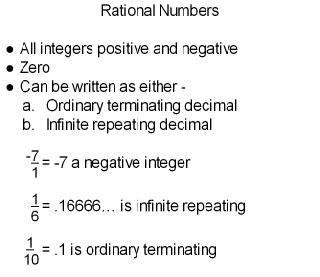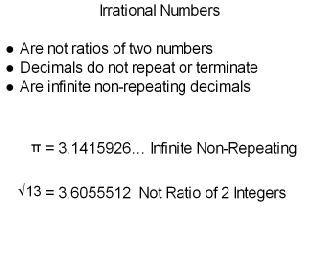 Sitemap
SitemapMobile Math Website
Rational and Irrational Numbers
Rational Numbers Definition
A real number that can be written or expressed as a ratio of two integers is rational.
All integers, positive or negative are rational numbers because they divide by 1.
Zero is a rational number that can be written as a ratio of two integer numbers, as 0/1.
Rational numbers can be written or expressed as either an ordinary (terminating) decimal or as an infinite repeating decimal.

Rational Numbers Examples:
- 5 can be written as a ratio of two numbers, 5/1. It can be written as 5.0, an ordinary decimal.
- 1/11 is a ratio of two integers. Its decimal equivalent is .090909… The decimal portion 09 repeats. The decimal value never terminates.
- 2/3 is a ratio of two integer numbers. Its decimal equivalent is .6666666… The decimal is infinite repeating, but never terminates. It is a rational number.
- 0.5 is the decimal equivalent of two integer numbers, 1/2. It is a decimal that terminates, but does not repeat. It is a rational decimal.
- √4 can be written as a ratio of two numbers. The √4 is 2. 2 can be written as 2/1. There is no decimal place value for 2 or 2/1. It is a rational square root number.
Some other rational square root numbers are: √9, √16, √36, √49, √64. - log10 x is 2 when x = 100. 2 is an integer, it is rational.
Irrational Numbers Definition
Real numbers that cannot be written as a ratio of two integers are irrational. They are decimal numbers that both do not terminate and do not repeat. Irrational numbers are infinite non-repeating decimal numbers.

Irrational Numbers Examples:
- √2 is not a ratio of two integers. Its decimal equivalent is 1.4142135… The decimal never repeats and never terminates. It cannot be written as a ratio of two integers. It is an irrational square root number.
- Other irrational square root numbers are:
√3, √5, √7, √10, 2 + √2, 4 − √7. - π is a math symbol with decimal value 3.1415926… It cannot be written as a ratio of two integers. It is an infinite non-repeating decimal number.
- e is a math symbol with decimal value 2.71828… It cannot be written as a ratio of two integers. It is an infinite non-repeating decimal number.
- log10 x when x = 2 is 0.30102999566… Is not a ratio of two integers. It is irrational.
Copyright © DigitMath.com
All Rights Reserved.